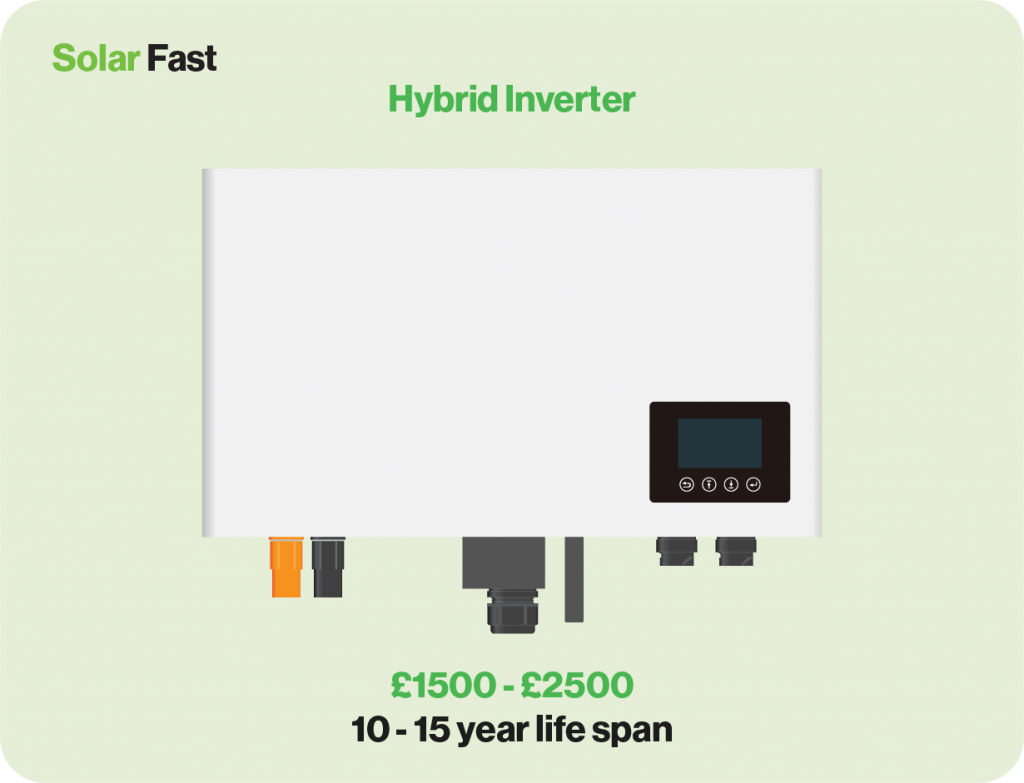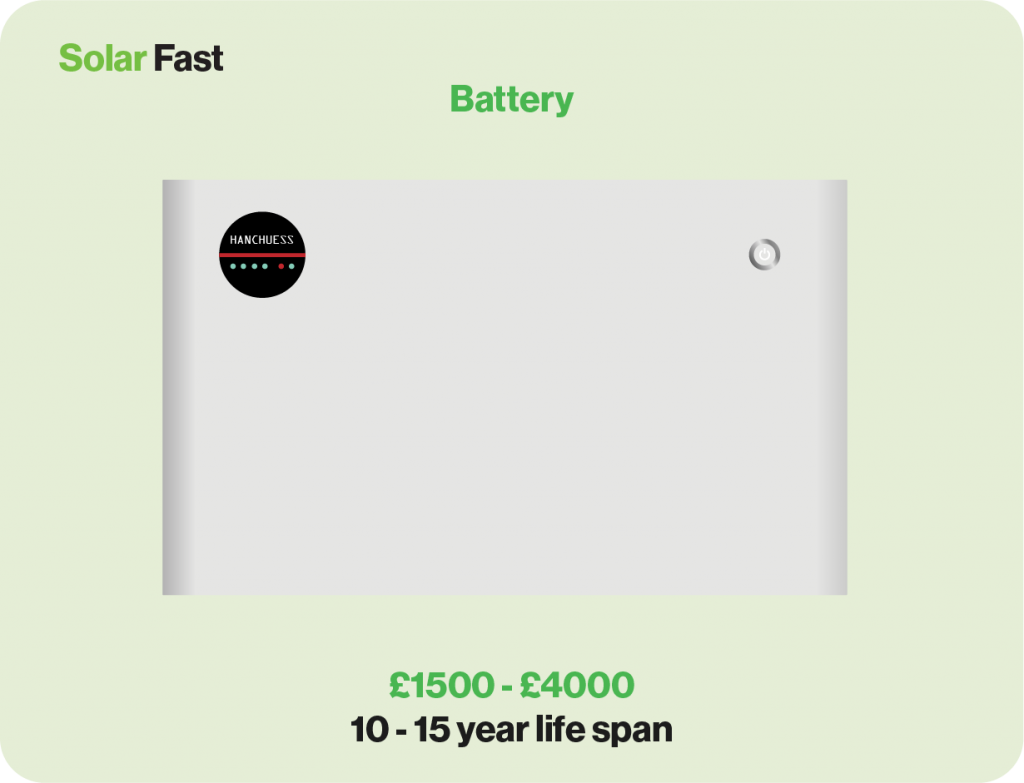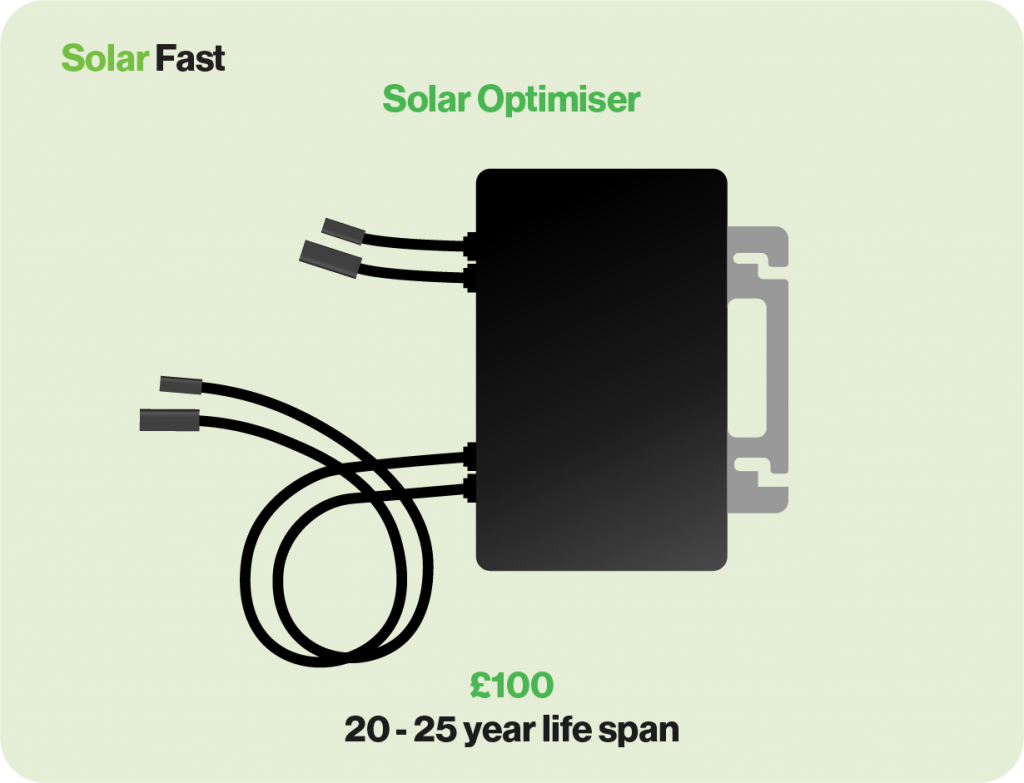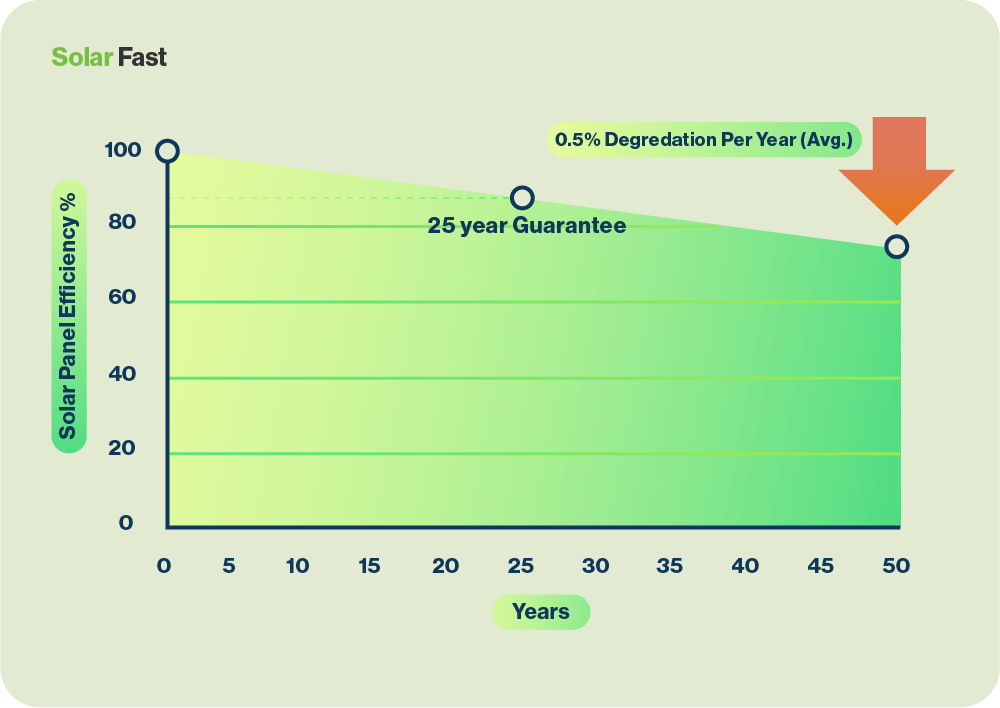This is one of the most asked questions on Google and the short answer is ‘Yes’… but then we would say that, wouldn’t we?
We don’t base that answer on just our opinion though.
Solar is uber-popular right now due to extortionate energy costs and the technology has improved immensely over the last 10 years.
Even giants such as B&Q, Eon, Octopus, Amazon have gone into the solar market to get a piece of the solar pie!
Plus, due to new tech, easier manufacturing and public demand, the price of solar panels has dropped by almost 83% in the last 10 years.
It’s also an investment in your home, like a conservatory, new kitchen or landscaping your garden.
We’re not asking you to take this answer at face value though, so let’s take a look at how long it will take to recoup your investment and how much a solar system can earn you during its lifetime.
Apart from Solar Panels what do I need for my Solar Energy System?
Sticking a load of panels on your roof isn’t going to be much good if you don’t have the other equipment to get all that lovely electricity into your home!
You don’t need much more equipment though:
Inverter
This is the box of magic that converts the DC electricity your panels produce into AC electricity you can use in the home.
Most installations would use a hybrid inverter, which not only covers the electricity for your home but also directs excess power to either your battery or the grid.
Learn more about how a solar inverter works.
They are also often the piece of equipment that monitors the system and identifies problems.
Hybrid inverters cost from around £1500 to £4000 and have a 10 – 15 year life span.

Battery
Batteries are not essential but they are a very sound investment as they allow you to use excess energy produced during the day after the suns has gone to bed.
The price of a battery, and therefore the payback time, would absolutely depend on how much energy you were looking to store.
Prices vary wildly, but an average solar battery will cost you between £1,000 and £4,000 depending on your set up.

Optimisers
You will need these if there are problems with shading or broken panels, as most domestic inverters will only work at the same efficiency as the most efficient panel in your array.
Long story short, they ensure low performing panels do not affect the rest of the array and keep the system running well.
They are about 200 quid each and last 20 to 25 years.

How much will a Solar Energy System cost in total?
First you need to find out how much electricity your home is using.
There is no point fitting a system that generates millions of kilowatts when you only 4 kilo watts a day.
| Type Of Home | No of People | Average Usage |
| Flat or 1-bedroom house | 1-2 people | 1,800 kWh a year 4.93 kWh a day |
| 2-3 bedroom house | 2-3 people | 2,900 kWh a year 7.94 kWh a day |
| 4+ bedroom house | 4-5 people | 4,300 kWh a year 11.78 kWh a year |
Factor in a bit of futureproofing and you have your number.
How many panels, inverters and batteries will you need?
Generally just the one inverter will do the job if it’s a hybrid one that controls battery charging and grid provision.
Panels, once again, will depend on the amount of electricity you are needing to generate, the efficiency of the panels (shading, roof angle) and the size of your roof.
| Type of home | Number of people | Required power kWh | Number of 3.85W panels | Estimated surface area |
| Flat or 1-bedroom house | 1-2 people | 1.8 KW | 6 | 15.5m2 |
| 2-3 bedroom house | 2-3 people | 3.8 KW | 10 | 238.m2 |
| 4+ bedroom home | 4-5 people | 4.6 KW | 12 | 323m2 |
When will my panels produce energy?
Little bit of science now, but we won’t get too Brian Cox about it.
Solar Panels don’t need direct sunshine to function, that’s a popular myth.
Learn more about solar power myths.
What they actually need is ‘photons’, or light molecules, that hit the panel to ‘jiggle’ the materials inside and produce electricity.
Photons are found in daylight of any kind, even when it’s cloudy or raining, so your panels work from the moment the sun rises in the morning, till it disappears over the horizon at night.
Learn more about how solar panels work.
The stronger the sunlight the more efficient the panels are at producing electricity but most arrays will produce enough power to run the average home on a cloudy day.
When your panels are producing electricity, you aren’t paying the energy companies 24.5p per unit (April 2024 price) – so you are already starting to pay for the system.
How long does it take to break even on a Solar Energy System?
So, the crux of that matter is what will you save, how will you calculate a breakeven point and what future costs are you looking at.
Current prices for electricity in the UK are 24.5p per kWh with the average household consuming, according to Ofgem, 2,900 kWh.
So, that’s £980 per year.
The UK, as a whole, gets an average of 12 hours of daylight a day – over 16 in summer and down to 8 in winter.
If your Solar Energy System is working well, and remember we are talking about and average 10 Panel array on a 3 bed house, it should produce about 4,800 kWh a year.
You can see that if you were able to harness all that power you’d be making money – but you’d have to have several batteries and a particular way of using electricity.
The problem with using it all is all of it is produced during daylight house, when you are consuming less electricity, so a lot of the energy will go to the grid at a nominal fee.
So, let’s assume you are using and storing about ¾ the energy you generate – 3,600 kWh – that’s a saving of £1224 a year.
13,000 divided by 1224 is 10.7 – so that’s the breakeven point of your system in years.
That’s at current prices and, while the Energy Price Cap is due to come down this summer, it is also predicted to be going up again by 2024.
If it goes up 10% your breakeven point would be 9.7 years.
If it goes up 25% you’ll have paid for your system in 8.5 years!
If you had £13,000 you wanted to invest and you took that money to the Halifax to invest it in an ISA, in 25 years it would earn about £3,000 in interest and be worth £16,000.
However, if you invested that money in a Solar Energy System you would save over £50,000 over 25 years, which is £37,000 of pure profit!
These are averages and predictions based on prices now and the information available to us.
If the price of electricity goes up again, you’ll be saving even more cash and your breakeven point will be either sooner.
Even if the price of electricity goes down, which is doubtful, you’ll still be saving a lot of money over the year.
It’s also worth noting that solar panels can last up to 50 years, they will be less efficient but as the efficiency drops at 0.5% a year they are still at 84% of their efficiency even after a quarter of a century. They usually have a warranty of 25 years. We offer 30..
Learn more about how long solar panels last.

What could affect your solar panel’s payback time?
The main thing that will affect your solar panel’s payback time is the price of electricity.
Prices fluctuate with the wholesale value of natural resources and the availability of fuel through the market.
We are seeing unprecedented energy prices now because of the invasion in Ukraine, the UK no longer being about to secure cheap energy from Europe and, let’s be frank, spiralling profit for multinational conglomerates.
As we have no idea what the future will bring (another reason to fit a solar system) we will have to rely on some experts and their predictions.
According to Cornwall Insight, an independent energy research, analytics and consulting firm, prices will be very volatile over the next 3 years but may settle at just below £150 per MWh on the wholesale market.
That’s just a little more than today’s prices, so that is actually going to speed up your payback time.
The factors that could affect your break-even point the other way is faulty equipment, accidental damage and extreme weather conditions.
We are experiencing more extreme weather in the UK, not nearly as much as some of our more southern cousins, but that usually manifests in drier weather and more wind. Solar Panels are hurricane tested for use in other countries so not much in the UK climate will bother them.
Can you make money from solar panels?
Sort of, but we wouldn’t recommend it as a way to pay for your panels.
The FIT, or Feed in Tariff, was officially brought to an end in 2009 but as the contracts on this scheme were for 20 years some people will still be benefitting.
In fact, there are companies that will buy the remaining contract off you or rent your panels and take the money generated.
That’s no good for new solar energy customers though.
The Smart Energy Guarantee (SEG), replaced the FIT and allowed the energy companies to set their own prices for buying your energy.
It is a legal requirement for companies to offer you an SEG if your installation MCS approved, so that leads to some offering a nominal payment of 1p per kWh just to comply.
Octopus are currently the best company for SEG rates but you must be an Octopus customer to take advantage of the higher rates.
| Supplier | Tariff Name | Tariff Length | Tariff Rate (p/kWh) | Payment cycle | Must be on supplier import tariff |
| 1 | Octopus | Fixed | 12-month fixed term | 15p | Yes |
| 2 | Tesla | Fixed | Unknown | 12.0p | Yes (must be Tesla Powerwall) |
| 3 | Tesla | Fixed | Unknown | 10.0p | Yes |
| 4 | British Gas | Currently Fixed | No fixed end date | 6.4p | Yes |
| 5 | Bulb Energy | Fixed | No fixed end date | 5.57p | Yes |
| 6 | E.ON Energy | Fixed | 12-month fixed term | 5.5p | Unknown |
| 7 | SSE | Fixed | No fixed end date | 3.5p | Unknown |
| 8 | Shell Energy | Currently Fixed | No fixed end date | 3.5p | Unknown |
| 9 | British Gas | Export & Earn Flex | Variable | 3.2p | Unknown |
| 10 | Utility Warehouse | UW Smart Export Gaurantee | Variable | 2p | Unknown |
Updated on 15th March 2023.
Is your property suitable for solar panels?
If you can say yes to the following you your property is suitable for a solar energy system:
- Do you have a roof or space for Solar Panels?
- Do you own the house of have permission from the owner?
- Will the area support the panels?
- Does your roof face at the correct angle?
Any adverts promising postcode lotteries on funding, magic free panels or any other ‘to-good-to-be-true’ scheme, we would advise caution as these things are very rare.
There are grants for making energy poor homes more ‘green’ but they are down to Many factors and are ultimately decided by the local authority funding.
Do solar panels increase the value of your home?
This is another, slow burning, way a solar energy system could make you some money.
Various studies have been done into whether house prices are increased by having solar, and obviously location has a lot to do with results.
Both the government and Admiral here in the UK have published articles that claim anything between 14% and 25% increases in homes with solar panels as compared to homes in the same area without a renewable energy system.
Like we touched on at the start of the article, we consider a Solar Energy System to be as beneficial a home improvement as a conservatory, a new kitchen o a pretty garden.







